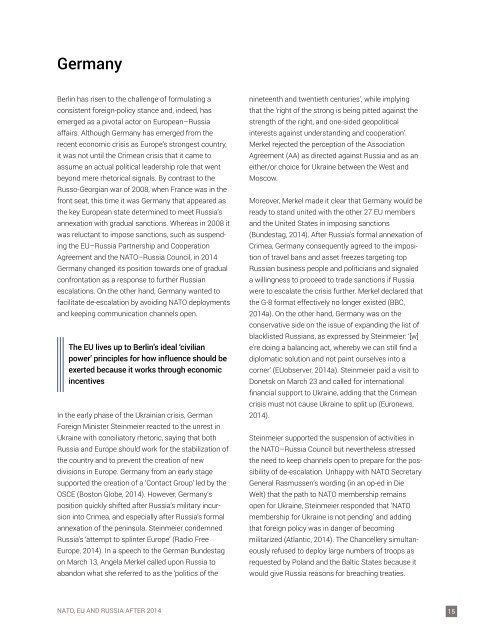You also want an ePaper? Increase the reach of your titles
YUMPU automatically turns print PDFs into web optimized ePapers that Google loves.
Germany<br />
Berlin has risen to the challenge of formulating a<br />
consistent foreign-policy stance and, indeed, has<br />
emerged as a pivotal actor on European–Russia<br />
affairs. Although Germany has emerged from the<br />
recent economic crisis as Europe’s strongest country,<br />
it was not until the Crimean crisis that it came to<br />
assume an actual political leadership role that went<br />
beyond mere rhetorical signals. By contrast to the<br />
Russo-Georgian war of 2008, when France was in the<br />
front seat, this time it was Germany that appeared as<br />
the key European state determined to meet Russia’s<br />
annexation with gradual sanctions. Whereas in 2008 it<br />
was reluctant to impose sanctions, such as suspending<br />
the EU–Russia Partnership and Cooperation<br />
Agreement and the NATO–Russia Council, in 2014<br />
Germany changed its position towards one of gradual<br />
confrontation as a response to further Russian<br />
escalations. On the other hand, Germany wanted to<br />
facilitate de-escalation by avoiding NATO deployments<br />
and keeping communication channels open.<br />
The EU lives up to Berlin’s ideal ‘civilian<br />
power’ principles for how influence should be<br />
exerted because it works through economic<br />
incentives<br />
In the early phase of the Ukrainian crisis, German<br />
Foreign Minister Steinmeier reacted to the unrest in<br />
Ukraine with conciliatory rhetoric, saying that both<br />
Russia and Europe should work for the stabilization of<br />
the country and to prevent the creation of new<br />
divisions in Europe. Germany from an early stage<br />
supported the creation of a ‘Contact Group’ led by the<br />
OSCE (Boston Globe, 2014). However, Germany’s<br />
position quickly shifted after Russia’s military incursion<br />
into Crimea, and especially after Russia’s formal<br />
annexation of the peninsula. Steinmeier condemned<br />
Russia’s ‘attempt to splinter Europe’ (Radio Free<br />
Europe, 2014). In a speech to the German Bundestag<br />
on March 13, Angela Merkel called upon Russia to<br />
abandon what she referred to as the ‘politics of the<br />
nineteenth and twentieth centuries’, while implying<br />
that the ‘right of the strong is being pitted against the<br />
strength of the right, and one-sided geopolitical<br />
interests against understanding and cooperation’.<br />
Merkel rejected the perception of the Association<br />
Agreement (AA) as directed against Russia and as an<br />
either/or choice for Ukraine between the West and<br />
Moscow.<br />
Moreover, Merkel made it clear that Germany would be<br />
ready to stand united with the other 27 EU members<br />
and the United States in imposing sanctions<br />
(Bundestag, 2014). After Russia’s formal annexation of<br />
Crimea, Germany consequently agreed to the imposition<br />
of travel bans and asset freezes targeting top<br />
Russian business people and politicians and signaled<br />
a willingness to proceed to trade sanctions if Russia<br />
were to escalate the crisis further. Merkel declared that<br />
the G-8 format effectively no longer existed (BBC,<br />
2014a). On the other hand, Germany was on the<br />
conservative side on the issue of expanding the list of<br />
blacklisted Russians, as expressed by Steinmeier: ‘[w]<br />
e’re doing a balancing act, whereby we can still find a<br />
diplomatic solution and not paint ourselves into a<br />
corner’ (EUobserver, 2014a). Steinmeier paid a visit to<br />
Donetsk on March 23 and called for international<br />
financial support to Ukraine, adding that the Crimean<br />
crisis must not cause Ukraine to split up (Euronews,<br />
2014).<br />
Steinmeier supported the suspension of activities in<br />
the NATO–Russia Council but nevertheless stressed<br />
the need to keep channels open to prepare for the possibility<br />
of de-escalation. Unhappy with NATO Secretary<br />
General Rasmussen’s wording (in an op-ed in Die<br />
Welt) that the path to NATO membership remains<br />
open for Ukraine, Steinmeier responded that ‘NATO<br />
membership for Ukraine is not pending’ and adding<br />
that foreign policy was in danger of becoming<br />
militarized (Atlantic, 2014). The Chancellery simultaneously<br />
refused to deploy large numbers of troops as<br />
requested by Poland and the Baltic States because it<br />
would give Russia reasons for breaching treaties.<br />
NATO, EU and Russia after 2014 15


